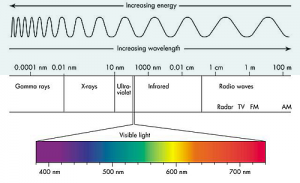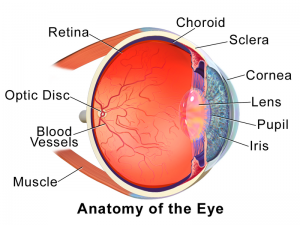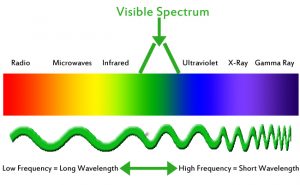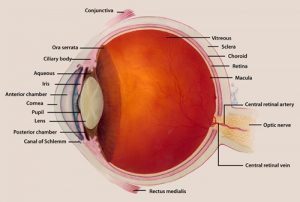Our eyes are one of the most important organs for perception, it would be a shame if we lost our vision from double tapping that instagram post or snapchatting a selfie. Human vision is only capable of seeing a portion of the electromagnetic spectrum, approximately 390 to 700 nanometers. How can our vision of shorter wavelengths have such an impact on our health, particularly sleep? This is referring to artificial blue light, found mostly in electronics such as computers and cell phones.
Wavelength analysis of your eye.
Studies have found that shorter wavelengths such as visible blue light emit more energy than longer wavelengths. The human eye is not very effective at blocking these high energy lights. Ultraviolet light sources such as the sun or lighting is easily blocked and unable to reach the retina. However, blue light which is only has a slightly longer wavelength than some ultraviolet light passes through the whole eye and reaches the retina.
![]()
What blue light does and how it affects you.
Although exposure to blue light has some benefits such as an elevated mood and wakefulness, the main issue tends to be sleep issues. The average human being tends to use electronic devices before they go to sleep. It was found that blue light at night suppresses the discharge of melatonin, the hormone acting as your internal clock. A more specific studying the effects of reading paper versus a light-emitting device before bed found that those reading on an electronic device had less REM sleep (dream sleep) and a greater discomfort in the morning.
How we can save our sleep?
A healthy diet, high in leafy green vegetables may potentially increase the protective pigments in the retina and mitigate some of the damage in vision. To put it simply, the easiest solution to this would be to avoid technology 2-3 hours before bed which tells the body it is time to sleep. On the other hand, many find it difficult to resist this urge and researchers have yet to find a solution. They do suggest using the new modern technological settings like optimizing the screen for night time use so we can all have a good nights sleep and have a nice productive day! Personally, at this particular time of schooling, I use technological devices for most studies because I have a higher productivity rate. Also, I give up some my sleep to maintain some of the fun in my life, sometimes watching tv or playing video games. We do our best to balance our lifestyle between work and leisure, and like a relationship, there is give and take. With the uprise in technology, it will be difficult to avoid artificial blue light, but instead, we should find methods to lessen the effects.

Source: Science Insider Youtube Channel
-Nicholas Wu




